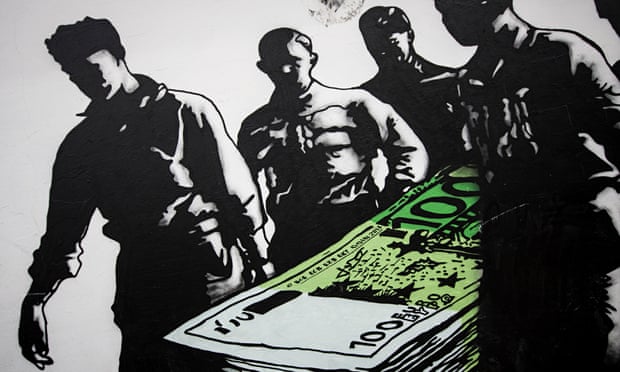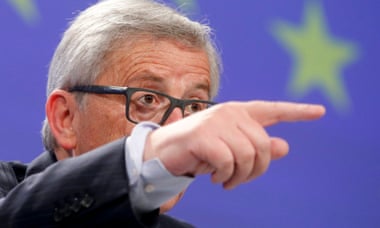Rafael Behr Wednesday 1 July 2015
The hard left should be careful what it wishes for. An end of ‘Brussels’ would not lead to better capitalism
Grafitti in Athens. ‘The old 1970s-style Euro-suspicion never went away but it was dismissed as reactionary nostalgia; flared ideological trousers at the back of a wardrobe. The Eurozone crisis has brought them back into fashion.' Photograph: Socrates Baltagiannis/Socrates Baltagiannis/dpa/Corbis

There is a view of Greece’s troubles shared by left and right fringes of British politics: they see a captive nation, traduced by undemocratic Europe. They urge solidarity, expressed as hopes for a no vote in Sunday’s referendum on Eurozone rescue terms. This is a symptom of new common ground between Ukippers, hard-line Tory Euro sceptics, Greens and the deeper red shades of Labour opinion.
Two camps decrying a Euro-stitch up from opposite ends of the ideological field leads to neat rhetorical symmetries. Jeremy Corbyn, the hard left’s candidate for the Labour leadership, identifies meeting the needs of big business as the EU’s “central goal”. He warns that a prospective free-trade deal with the US is a surrender to “greedy bankers and multinationals”. Paul Nuttall, Ukip’s deputy leader, denounces the same process as a “scam that hurts workers”. Douglas Carswell, the party’s only MP, lists “vile corporate banking interests” among the architects of current Greek woe.
Live Greece debt crisis: Athens fails to repay IMF as bailout runs out - as it happened
Greece has become the first advanced economy to fall in arrears to the IMF as its second bailout expires
Each side agrees that capitalism lies at the heart of Europe’s problems, but the left thinks there is too much of it and the right says not enough. The Carswellite charge is that EU bureaucrats suffocate markets for the benefit of crony corporations at the expense of consumers. The Corbynist tendency sees weak-minded politicians stripping away workers’ rights at the behest of their business paymasters. The Venn diagram intersects at the point where democracy is said to be imperilled by a conspiracy of opaque institutions based in Brussels.
Anti capitalist objection to the European project is as old as Britain’s admission to the common market, but as a strain of Euro scepticism (the phenomenon predates Tory coinage of the word) it has lain dormant for a generation. Thatcherism taught the left to cherish continental solidarity as a means to defend social protections that were under threat at home. By the time Tony Blair came along, pro-EU feeling had become a reflex response, made visceral by pleasure in watching anti-EU feeling destroy John Major’s government.
The old 1970s-style Euro-suspicion never went away, but it was dismissed as reactionary nostalgia – flared ideological trousers at the back of a wardrobe. The Eurozone crisis has brought them back into fashion.
Greece was not qualified to join the single currency. Its entry was a collaborative political fraud, the scale of which was revealed in the financial crisis. That in turn exposed lethal design flaws in the whole euro project – “a burning building with no exits”, in William Hague’s description. The price of continued membership has been recession, mass unemployment and national impoverishment. Creditor countries bailed out their own banks with cash that passed only notionally through Athens, while berating Greek voters for ill-advised electoral choices.
Greece was not qualified to join the single currency. Its entry was a collaborative political fraud
There is vindication here for angry brigades on the left and right in Britain. For Ukip it is proof that the rights of a nation’s citizens will always be subordinate to the integrationist zeal of European elites – that Brussels sees referendums and elections as flies in its federalising ointment. For the hard left it is proof that big finance, acting as political puppet-master, will always try to crush radical dissent and impose state-shredding austerity, even where it has demonstrably failed to yield economic growth.
These accounts share a readiness to cast “Europe” as a single coherent actor with malicious motives playing out a parable of universal significance. By extension, there is unwillingness to see the situation as an accident involving a range of actors, with mostly decent motives, failing to manage conflicting demands under highly specific circumstances. There are many difficult lessons for the European project here, but they do not invalidate it completely.
There is blame enough for everyone. Alexis Tsipras’s promise to the Greek people of euro membership without austerity was dishonest. Other European leaders were constrained by their own democratic obligations. There are citizens from Ireland to Latvia who have already swallowed bitter reforming medicine and paid taxes that fund bailouts. They resent Athens threatening to destabilise their economies with demands for special treatment. This is not to say those views are fair, or have more weight than Greek suffering, only that a morality tale of wicked, bullying Europe and heroic Athenian resistance doesn’t illuminate what is going on.
It is a thankless task defending EU processes when they have ballsed-up the Greek situation so badly. It would also be reckless to conclude that, since the crisis has revealed the limits of European institutions as a mechanism to express solidarity between nations, those institutions can never again aspire to that ideal.
Jean-Claude Juncker. Greece’s entry ‘in turn exposed lethal design flaws in the whole euro project – ‘a burning building with no exits’, in William Hague’s description’.
The EU is meant to aggregate the power of national governments in response to global forces that might otherwise be beyond the capacity of individual states: climate change, energy security, terrorism, and strategic parity with the US, China, India and Russia. Part of that function is political mediation in the borderless realm of financial globalisation. This is one reason why the Eurosceptic right hates “Brussels”. It is the place where politicians – democratically elected heads of government – can organise with combined authority to moderate international capitalism. They may not apply the brakes with sufficient force to satisfy the radical left, but that is not a reason to cheer alongside Ukip as the coach veers towards a cliff.
Having lost the battle against conservative economics at home, the activist left in Britain exports its surplus indignation to Greece. Anti capitalist voters may be in short supply here, but Syriza keeps the flag flying. The EU is then cast as a high temple of austerity, as if the whole project was cooked up by Angela Merkel and David Cameron in 2010. In this way, a theme that has dominated right-wing discourse on Europe – the faceless, unelected conspiracy against free citizens – is spreading on the left.
In both camps the Eurozone crisis is met with a hint of relish: the frisson of anticipation that massive upheaval is nigh, that a new order will rise from the ashes of calamity. It might. The EU could go the way of the League of Nations. An institution, conceived as the antidote to violent nationalism, where leaders gather to solve problems through negotiation and compromise, can fail. But there is no evidence that if it does the result is more democracy and better capitalism. The opposite seems more likely.
